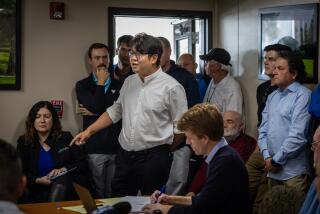Duval’s Talk of Boycott Ruffles Ryder Cup Team
- Share via
What happens when money meets patriotism? Probably a lot like what happened Wednesday when David Duval was quoted as saying there could be a U.S. player boycott of the Ryder Cup unless the PGA of America begins paying the players.
“It could happen this September,” Duval said, according to an article in the September issue of Golf Digest. “More than likely, though, next time in 2001. Certainly within two more. It’s imminent. This is just from talking to the guys. Some of them are fed up.”
Maybe, but it’s getting a little crowded in that department. Ben Crenshaw, the U.S. Ryder Cup captain, said he telephoned Duval and that Duval had backed off any suggestion of a boycott.
“There will be no boycott,” Crenshaw said Wednesday.
The Ryder Cup, a biennial match-play golf event between 12-player teams from the U.S. and Europe, is scheduled for Sept. 24-26 at the Country Club in Brookline, Mass. It is being billed as the most profitable event in the history of golf.
The total estimated economic impact on the local economy is $150 million, three times that of the major league baseball All-Star game two weeks ago.
Each U.S. player receives a $5,000 stipend and expenses from the PGA of America.
While many players in the past have said they would play for free for the privilege of representing the U.S., apparently that opinion is not universally shared among those players expected to be part of this year’s team.
Duval and Mark O’Meara have been outspoken in their criticism of the PGA of America over the pay issue, especially since the PGA--a nonprofit organization independent of the PGA Tour--is expected to gross an estimated $63 million from the Ryder Cup and net as much as $17.5 million.
Crenshaw said he told Duval and O’Meara that there would be no increase in pay, that the issue shouldn’t have been discussed in the media, that the best way to express views is through proper channels and that the flap has hurt the U.S. team and helped the European team.
Presumably, other than that, Crenshaw had no problems with the pay issue.
“It was time for the captain to act,” Crenshaw said. “I think they all know where I stand now.”
Crenshaw also said he had a conversation with Duval after the British Open about Duval’s remarks that the Ryder Cup isn’t that big a deal and that it’s more of an exhibition.
“I told him he shouldn’t be saying those things since he’s never played in the Ryder Cup,” Crenshaw said. “I think we’ve cleared the matter up.”
Also, O’Meara has called Crenshaw and apologized for causing a problem.
But at the same time, the pay-for-play issue may continue to be a divisive factor. The PGA could review its stance at a regularly scheduled board of directors’ meeting, although there may not be much sentiment to change.
Jim Awtrey, the chief executive officer of the PGA, has said the uniqueness of the Ryder Cup would be altered forever if the players were paid.
Duval insisted Wednesday that he never said the word “boycott,” but said the players want some say about where the money goes. Duval and Tiger Woods advocate a fee for the players that could be given to charity.
“We should be given some money to designate to go where we want--to my local charity back home or to some program I feel strongly about,” Duval said.
Duval has made $3.019 million this year and Woods has made $2.62 million.
In the Golf Digest article, Woods was just as upset about the Ryder Cup pay issue as he was about the on-site formalities.
“It’s completely unfair, the way it is now,” he said. “I played in one and didn’t enjoy it at all. It’s like ‘pros on parade.’ They take us to a bunch of functions that raise money, yet everybody is compensated except us. Let’s take some of that money and spread it around.”
Crenshaw pointed out that the PGA contributes a quarter of its television money, about $2.5 million, to the PGA Tour. There is another financial bonus: the $5-million NEC Invitational in Akron, Ohio, which is limited to players from the Ryder Cup and Presidents Cup.
In addition, many players’ agreements with their sponsors include bonuses for winning majors and for playing in Ryder Cup matches.
But whatever the financial arrangements, players such as Tom Lehman feel strongly about a possible boycott.
“There will never be a boycott,” he said. “Tom Lehman will never boycott. I would pay to play in the Ryder Cup. That’s all I want to say about it.”
(BEGIN TEXT OF INFOBOX / INFOGRAPHIC)
‘99 Ryder Cup Revenues
According to Golf Digest, this year’s Ryder Cup at the Country Club in Brookline, Mass., will generate $63 million in gross revenues, with profits approaching $23 million, to be divided between the PGA of America and the host site. Golf Digest’s analysis:
NBC TV rights: $13 million
Corporate tents: $16 million
Corporate tables: $15.6 million
Merchandising: $8 million
Ticket sales: $5 million
Food and beverages: $2 million-$3 million
Program advertising: $2 million
Total gross revenues: $63 million
Projected expenses: $38 million-$40 million
Net profit for PGA of America: $16.5 million-$17.5 million
Net profit for the Country Club: $5 million-$6 million
More to Read
Go beyond the scoreboard
Get the latest on L.A.'s teams in the daily Sports Report newsletter.
You may occasionally receive promotional content from the Los Angeles Times.










